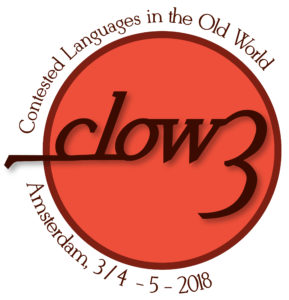
After the previous editions in Bangor (2013) and Turin (2016), we are proud to announce the 3rd edition of the Contested Languages in the Old World (CLOW) conference series, to be held in Amsterdam on May, 3-4, 2018. The conference is jointly organized by Federico Gobbo (University of Amsterdam), Mauro Tosco (University of Torino) and Marco Tamburelli (Bangor University) and aims at bringing together linguists, political scientists, legal experts, writers, activists and other scholars working on the current status and future prospects of “contested languages”, starting from the reflections by Nic Craith (2006). A special parallel panel is devoted to mobility and inclusion of contested languages in Europe. The working language of the conference is English.
Background
Only a fraction of European languages listed in the 2010 “UNESCO Atlas of World’s Languages in Danger” enjoys some degree of recognition within the state(s) in which they are spoken. This leaves many European bilinguals whose linguistic rights are limited to one of their everyday codes – often not their preferred one.
The meeting will focus on contested languages, i.e. linguistic codes which are generally recognized as such by the international scientific community: e.g., they are reported as languages in Ethnologue and tend to have an unambiguous ISO 639 code, and also their status as separate languages is often not questioned by linguists, especially out of their home country. Still, they have not usually attained any reasonable degree of official recognition, or, where recognition has been granted, especially at the local level, it has not triggered any reasonable attempts at language development. In other words, official recognition is not a guarantee for the absence of contestedness.
In contested languages, speakers’ awareness varies, but it is generally low and restricted to active minorities. The result is that these European bilinguals do not perceive themselves as such, and therefore their language loyalty and intergenerational transmission is in danger. Generally, the visibility of these languages in the public sphere is negligible.